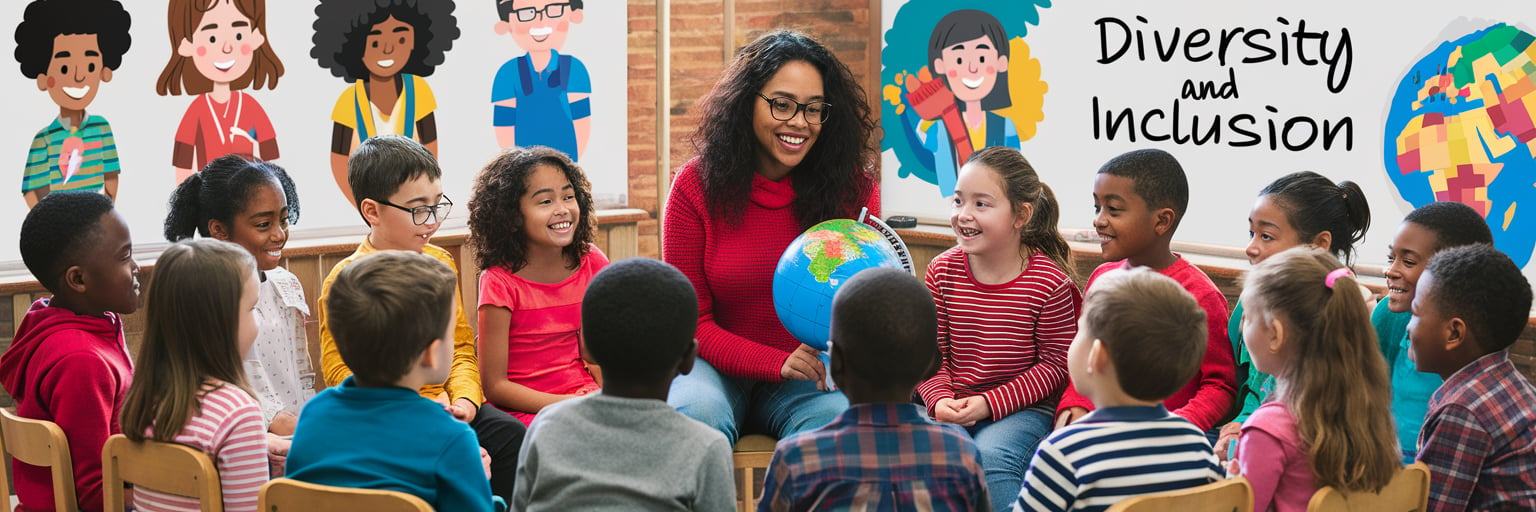In an increasingly interconnected world, raising children who embrace diversity and practice inclusion is more important than ever. Teaching kids to appreciate differences in culture, language, abilities, and perspectives equips them to become empathetic and informed global citizens.
This article explores the significance of fostering an inclusive mindset in children and provides actionable strategies for instilling these values at an early age.
Why Is Diversity and Inclusion Important for Kids?
- Encourages Empathy: Understanding others’ experiences helps children relate and connect.
- Prepares for a Globalized World: Embracing diversity enables kids to thrive in multicultural environments.
- Reduces Prejudice: Exposure to different perspectives combats stereotypes and biases.
- Fosters Collaboration: Inclusive kids are more likely to work effectively with others.
1. Start with Conversations
Open communication is key to teaching diversity and inclusion.
- Answer Their Questions: Kids are naturally curious. If they ask about differences, provide honest and age-appropriate explanations.
- Discuss Similarities and Differences: Emphasize that while people are unique, everyone shares common human experiences like love, joy, and challenges.
- Address Biases Early: Challenge stereotypes when they arise and explain why they are unfair.
2. Celebrate Cultural Diversity
Introduce your child to the richness of global cultures:
- Try International Foods: Cook dishes from different cuisines and discuss their origins.
- Attend Cultural Events: Participate in festivals or celebrations from various traditions.
- Learn New Languages: Teach simple words or phrases in different languages to spark curiosity.
- Explore Music and Art: Share songs, dances, and artwork from diverse cultures.
3. Use Books and Media as Tools
Stories and media are powerful ways to introduce diversity:
- Diverse Books: Choose books with characters from various backgrounds and experiences, like Last Stop on Market Street or All Are Welcome.
- Inclusive TV Shows and Movies: Watch programs that showcase multicultural and inclusive narratives.
- Representation Matters: Highlight stories that reflect your child’s identity as well as those of others.
4. Encourage Friendships Across Differences
Help your child build connections with peers from various backgrounds:
- Join Multicultural Groups: Participate in community activities that promote diversity.
- Encourage Teamwork: Sign your child up for sports or clubs where they can interact with different people.
- Model Inclusive Behavior: Show acceptance and kindness to everyone, regardless of their background.
5. Teach Empathy and Perspective-Taking
Help kids understand the feelings and experiences of others:
- Role-Playing: Use scenarios to help them practice empathy, such as imagining how someone might feel in a new environment.
- Volunteer Together: Participate in charitable activities that expose your child to different communities and their challenges.
- Discuss Historical Events: Age-appropriate discussions about history can help kids understand struggles for equality and justice.
6. Address and Celebrate Differences
Teach children that differences are something to value, not fear:
- Talk About Disabilities: Explain different abilities and emphasize the importance of inclusion.
- Challenge Gender Stereotypes: Encourage kids to explore interests freely, regardless of traditional gender roles.
- Discuss Family Structures: Explain that families can look different, including single parents, same-sex parents, or multigenerational households.
7. Encourage Open-Mindedness
Raise children who are curious and accepting of the unknown:
- Foster Critical Thinking: Teach kids to question stereotypes and think for themselves.
- Encourage Curiosity: Let them ask questions about different cultures or practices without judgment.
- Travel (If Possible): Visiting different places broadens their perspective and appreciation for diversity.
8. Model Inclusive Behavior
Children learn by watching their parents. Set an example by:
- Using Inclusive Language: Avoid making assumptions about people based on appearance or background.
- Standing Against Discrimination: Speak up against prejudice when you see it.
- Building Diverse Relationships: Surround yourself with friends and acquaintances from various backgrounds.
9. Create an Inclusive Home Environment
Foster an atmosphere that reflects global values:
- Diverse Toys and Décor: Provide dolls, action figures, and art that represent different cultures and abilities.
- Celebrate Multicultural Holidays: Incorporate traditions from around the world into your family’s celebrations.
- Open-Ended Discussions: Create a safe space where your child feels comfortable asking questions and expressing thoughts about differences.
Conclusion
Raising global citizens begins with teaching children to value and respect diversity and inclusion. By exposing them to various cultures, fostering empathy, and modeling inclusive behavior, you prepare them to navigate the world with kindness and understanding. In doing so, you’re not just shaping your child’s character but also contributing to a more inclusive and compassionate future for everyone.

